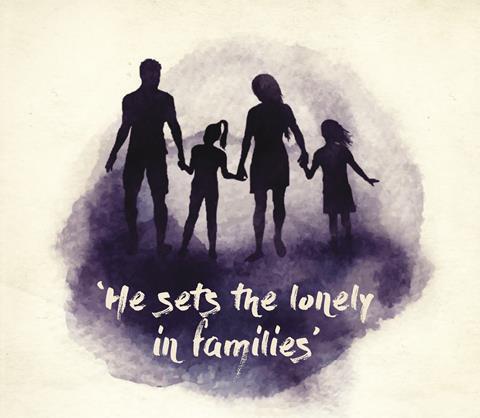Christians are twice as likely to adopt than the general population, but thousands of children are still in need of a safe, stable home. Emma Fowle explains how every Christian can help create an environment where children can thrive
Earlier this year, the then-children’s commissioner for England, Anne Longfield, declared the care system to be “in crisis”. There are more than 103,000 children and young people in care right now (an increase of 28 per cent in the past decade) and a new child enters the care system in the UK every 15 minutes.
Accordingly to the NSPCC, 63 per cent of children are in care because of abuse or neglect. Parental or child illness or disability, bereavement and substance abuse are also common reasons. Whatever the individual circumstances, all children in care will have suffered severe loss and trauma, often at an extremely early age. The effects of Covid-19 have yet to be fully realised, but with reports of abuse of babies rising by 20 per cent, the reduction of in-person social work visits and contact with schools, unemployment reaching its highest levels since 2017 and rates of depression doubling, there’s every reason to expect things to get worse.
Whether it’s Pharaoh’s daughter adopting Moses, the Torah’s requirements that Israel look after the fatherless, widow and alien (Exodus 22:22-23; Deuteronomy 24:17-22) or the themes of our own adoption by God (Galatians 4:5), scripture has plenty to say on this issue. And over the past decade especially, there has been a huge increase in awareness among Christians about fostering and adoption. This is thanks in part to campaigning organisations such as Home for Good, which was set up in conjunction with the Evangelical Alliance in 2013 to “find a home for every child who needs one”. When Southampton City Council ran an emergency appeal that same year, local church leaders not only prayed and fasted, they also encouraged their congregants to consider fostering and adoption. That resulted in a record number of Christians becoming foster carers, and ties between the Church and local authorities have subsequently been strengthened across the UK. Most recently, Bristol City Council reported an unprecedented response after asking local churches for help in recruiting emergency foster carers during Covid-19.
Home for Good CEO Tania Bright wants to build more bridges between Christians and councils, enabling prospective foster carers and adopters to be confident in the positive aspects that their faith brings to the table, and championing these benefits to social workers. Bright reports there’s increasing “spiritual literacy” in many local authorities, but others have concerns social workers may not be sympathetic to Christians who hold traditional views on contentious issues, especially same-sex marriage.
Negative media reports proliferate. In one recent case, a Christian couple were seemingly told they could not adopt children because of their “concerning” views on LGBT issues. Even if Christians are keen to adopt, are the authorities really ready to welcome us with open arms?
For Bright, it’s important that Christians understand the wider legal landscape. Local authorities “have a responsibility to ensure that any person whom they’re placing a child with will uphold the nine protected characteristics [of the Equality Act 2010],” says Bright. This “includes sexuality, as it does race, disability etc”.
THE CHURCH SHOULD BE A LEADING LIGHT IN THE SYSTEM
While she is keen to emphasise that Christians are free to hold whichever theological position they wish, the question is whether they would expect a child in their care to own that same view. Beyond this, much of the issue, says Bright, is communication. As one church leader, foster carer and adoptive parent puts it to me, often “Christians don’t speak council, and councils don’t speak Christian”. To this end, Home for Good are running “faith literacy training”, facilitating pre-assessment discussions “in a safe place where people can talk about their theology” and professionals can help frame it in a way that local authorities can understand. This helps people feel confident about their faith and be equipped, “because they know what’s being asked and why,” says Bright. “It’s not about local authorities being discriminatory. They are quite literally wanting to ensure that that the child is respected in terms of their decisions in their life.”
Bright is adamant that on the whole, faith is viewed positively and Christian carers should not be deterred from opening up their homes. “My personal experience, and many others that I’ve encountered, has been incredibly positive,” she says, “because what local authorities are looking for is a resilient family. They’re looking for people who have got really strong community relationships so that the adopter or the foster carer are supported – because it’s a tough gig at times.”
Harvey Gallagher is chief executive of the Nationwide Association of Fostering Providers (NAFP). Although he doesn’t have a faith, he is also keen to emphasise that Christians “are hugely welcome”, acknowledging that foster carers with a faith make up a huge proportion of the total number of carers in the UK. Research from Barna Group found that practising Christians in the US are also more than twice as likely to adopt as the general population. “Fostering agencies really welcome Christian people to come forward,” Gallagher says, “because there’s evidence that they have a lot of resilience, partly because of their faith and partly because of the communities and networks that they have around them.”

A CHRISTIAN RESPONSE
Elijah Kirby was two years old when he was removed from a chaotic home environment. Speaking to me over Zoom, he explains drugs, violence and prostitution were a very present reality. Throughout his childhood he attended seven different schools and had multiple foster placements, ranging from benign but short-lived to disturbing and abusive. Eventually, he was placed with a Christian family who provided him with a long-term foster home. He cites their “unconditional love” and the “support of a local church” as the “two foundational things in my life that totally transformed me”.
After becoming a Christian in his teens, Kirby went on to become a pastor and church planter. Later, he left a national role at Tearfund to establish NorthPoint Care, a fostering agency based in the north east of England. When we speak, Kirby is “dead embarrassed” to admit that it was others who first pointed out the need, and his own unique position to do something about it. “I’d never looked at the system,” he admits, adding “[I thought] ‘surely every child leaves well-rounded and totally thriving?’”
It wasn’t until Kirby researched the issue that he discovered just how poor the outcomes typically are for care-experienced children: 39 per cent of care leavers aged 19-21 are not in education, employment or training; 33 per cent become homeless within two years of leaving the system; 27 per cent of those in custody today are care-experienced, and 25 per cent of the homeless population were once in care, as were 70 per cent of sex workers. But perhaps the biggest indicator of the system’s shortcomings is the fact that £2.8bn (32 per cent of the annual £8.8bn spend) is accounted for by an intergenerational cycle of care leavers whose own children then eventually go on to enter the system themselves.
ALL CHILDREN NEED JUDGEMENT-FREE SPACE TO BE THEMSELVES
For Kirby, the seriousness of these figures “emotionally compelled” him to imagine a better way; a model based on his own experience of “the Church being engaged, creating encounters for young people to experience love, nurture, affirmation”. By running NorthPoint as a social enterprise, only employing social workers who are care-experienced themselves, involving churches and offering first-class training, support and enrichment activities, Kirby is confident that they can do something different. Their aim is to demonstrate that a Christ-centred fostering service, fully supported by the local church, can produce groundbreaking results. “Because it’s based on the local church, there’s communities around foster families that will wrap around them and create support, we think breakdowns will be significantly reduced. It puts it totally back on the Church to be a leading light in the system.”
Like all adoption and fostering agencies in the UK, NorthPoint must accept applications from anyone, regardless of faith. Far from seeing this as a negative, Kirby is quick to point out the opportunity for the Church. By offering all applicants the chance to connect with a church, toddler group or youth group, “it’s introducing local churches to the non-Christian community around them and saying: ‘Here’s how you can love these people and provide these layers of support.’” Some might not take up the offer, says Kirby, in which case, it may be suggested that NorthPoint is not the best fit “because our model is the local church”. But many do say yes.
6 ways to show you care

1) Pray and seek God: Ask him honestly how he would like you to respond to this issue.
2) Find out more about fostering or adoption by contacting your local authority or a Christian organisation such as Northpoint Care (northpointcare.co.uk), Cornerstone UK (cornerstoneuk.org) or Capstone Foster Care (capstonefostercare.co.uk).
3) Train your church by utilising the resources offered by organisations such as Home for Good (homeforgood.org.uk). They provide specific training, speakers and local advocates to help local churches support adoptive families and foster carers.
4) Use your voice and make talking about caring for the vulnerable part of the life of your church through sermons, teaching and everyday conversation.
5) Lend a hand by helping families who foster or adopt practically with meal trains, babysitting or jobs around the home. Take an interest and be a ‘significant adult’ in their child’s life.
6) Buy a bag from Madlug and they will donate another one to a child in care.
HEALTHY CHURCH CULTURE
All children need judgement-free space to be themselves, especially those who carry the invisible scars of deep trauma. For Rev Luke Bacon, curate of St John’s Chatham and himself adopted, the wider Church community has a vital role to play in this. Speaking of the woman who regularly sat and played with his own adopted daughter in church so that he and his wife could engage with the service, he says that supporting foster carers and adoptive parents is vital, and requires creating a loving community that asks: “How can we help? How can we pray? Can we bring the meals round, because I know stuff is tough for you at the moment?”
Some Christians will foster or adopt, but every Christian is called to help build a healthy local church community where all are welcomed and supported. “I think that as the Church faces up to the fact that we’re all broken people being made whole in the love of Jesus, it makes an environment that’s more conducive to families growing through adoption and taking on the risks that come with that,” he says.
It isn’t just through fostering or adoption that Christians can make a difference. Krish Kandiah is one of the original founders of Home for Good and now chairs the government’s adoption and special guardianship leadership board. He wants Christians to consider their career choices. Responding to biblical truths such as “God places the lonely in families” (Psalm 68:6, NLT) could mean working in politics or social work, he says. “I’d love to see a whole generation of young people considering careers where they can contend professionally for vulnerable children, and have that seen as an acceptable and worthy mission field for the Church.”
For others, such as Dave Linton, the response to the care crisis was different again. On a foster carers’ training course, Linton and his wife watched a video of a young girl speaking about how children in care often transported their belongings between care placements in black bin bags, as they did not own luggage of their own. Linton “heard nothing else” that day, and went home determined to make a difference. Initially, he considered collecting bags from friends and family, but quickly discovered that the scale of the problem would require a different solution. Based on a similar premise to TOMS shoes, Linton established Madlug, a luggage company that donates one bag to a young person in care for every bag that they sell to customers.
Linton’s own experience of being supported by his local church after his father passed away when he was just five years old was deeply significant in his understanding of Church as wider caregivers. Quoting James 1:27, Linton tells me: “‘This is what religion is – love of orphans and widows in times of trouble.’ That’s not a ‘for some’, that’s for all. The whole Church is called to love the orphans, because these kids need mentors, they need uncles, they need significant adults. I don’t believe there’s anywhere better than the Church to do that wraparound care.”
BREAKING THE CYCLE
What’s the answer to the care crisis? “You’ve got to advocate nationally,” says Kirby, “and locally, you’ve got to deliver the stuff.
“For the last ten years, [the Church] has been brilliant at saying things like: ‘How do we extend hospitality?’ But I think that’s been mark one. Mark two has got to be: ‘How do we show children and young people unconditional love? How do we create permanence? Brilliant moments for children and young people with the best carers who say: ‘We love you, we’re here for you, you can kick and scream and push us but actually, we won’t let go.’”
Kirby believes that creating these “beautiful moments” and putting them “back at the heart of the care system” is the only thing that will break the cycle of intergenerational care and fix our broken system. It is a job that the Church is uniquely called to do, and we can all play our part, whatever that looks like.






































